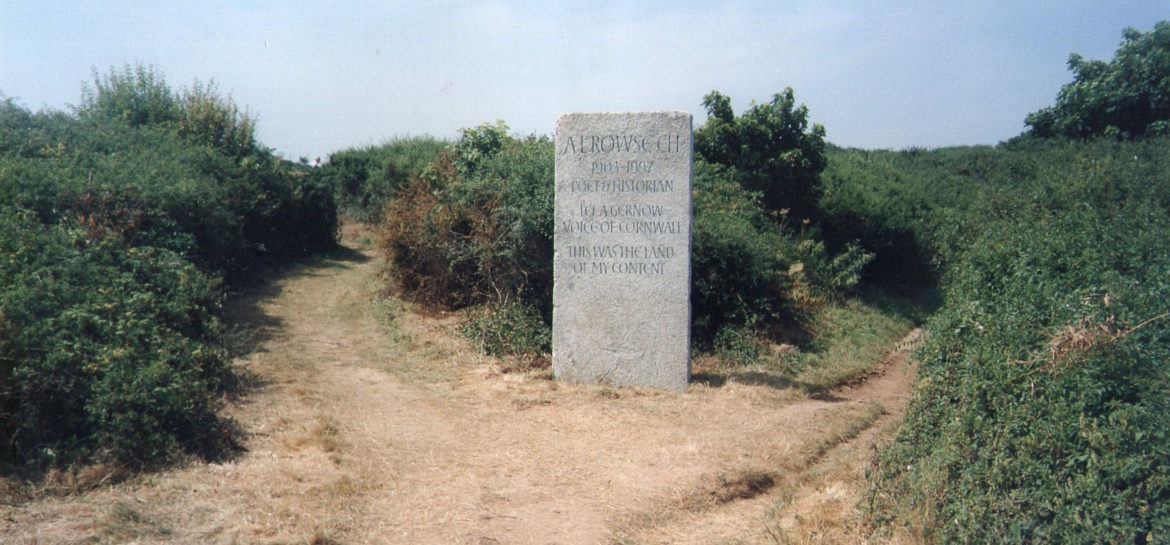
Cornishman Phillip Hunt brings us the story behind the erection of the A L Rowse memorial and of his memories of his association and friendship with him.
The eminent Cornish Historian and Poet Dr Alfred Leslie Rowse CH passed away on 3rd October 1997 at his home at Trenarren, near St Austell, at the end of a long and productive life of letters which began close to St Austell, at Tregonissey on 4th December 1903.
It emerged on publication of his Will that it included not only his generous personal bequests but a Schedule of Memorials, which gave detailed instructions and wordings for three memorials that he wished to be erected in his name. These he hoped would be placed in St Austell Parish Church, Truro Cathedral and All Souls College Oxford. In addition, he gave the wording for his gravestone in Charlestown Church Cemetery where he wished his ashes to be buried.
The idea of a prominent public memorial to Dr Rowse, in addition to those he requested, surfaced during a meeting at The National Trust in Cornwall’s Regional Office at Lanhydrock, Bodmin, called to discuss his generous bequest to the organisation. Those at the meeting felt that something on the lines of the Q Memorial to Sir Arthur Quiller-Couch at Penleath Point near Fowey would not go amiss. This would be an opportunity to recognise the enormous contribution made by him to scholarship and literature as an internationally known man of letters, historian, biographer, poet, author and lover of Cornwall.
Contact was swiftly made with The Cornwall Heritage Trust, another beneficiary of A L Rowse’s Will, whose Chairman Sir Richard Trant enthusiastically endorsed the idea, along with the third major beneficiary, The Royal Institution of Cornwall. The Lord Lieutenant of Cornwall, Lady Mary Holborow graciously agreed to be patron of an appeal to raise funds for such a memorial, which was launched by the three bodies in October 1998, just twelve months after he had passed away.
Having decided to go ahead, and with the appeal going well, the decision regarding the siting of the memorial had to be considered. Soundings were taken from friends and the public asked for suggestions. Amongst those received were, the Gribbin, Luxulyan Valley, Carn Grey and Black Head. Whilst all of those places were loved by A L Rowse it was finally decided that somewhere on Black Head near Trenarren, his home since 1953, would be the most suitable and the most likely to have been approved by him.
Accordingly a party of three, Dr John Rowe, Roger Penhallurick and Phillip Hunt, representing The Cornwall Heritage Trust, The Royal Institution of Cornwall and The National Trust in Cornwall set out, led by Dr Rowe, to identify a suitable site on Black Head. Several seemed possible, one or two actually in sight of Trenarren being especially attractive. In the event, the best and most imposing site was deemed to be on the neck of Black Head where the path from the Ledra joined the Coastal Path and the path out to the Head itself, giving far reaching views to the Gribbin in the east and the Dodman in the west from the Memorial Site.
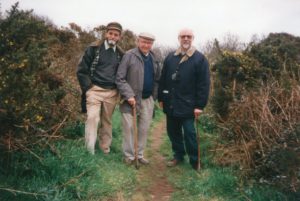 The Memorial Team
The Memorial Team
The owners of the land, the Hext Family, supported by their tenant farmer, Roger Treleavan, were happy to give permission for the site to be used for the memorial. The National Trust agreed to undertake the ground preparation works necessary at the coastal site, with its difficult vehicular access, and the erection of the memorial in due course.
The National Trust in Cornwall also generously agreed to donate a weathered piece of granite for the memorial which in order to do justice to Dr Rowse and the site, was an imposing 8 feet high, 4 feet wide and 9 inches thick, weighing in at 2 tons. The eminent, Boscastle born sculptor, Anthony Fanshawe, was tasked with carving the inscription on the stone, which was transferred by The National Trust to the De Lank Quarry at St Breward for preparation before being taken to Anthony’s workshop.
Many hours of thought were given by the Appeal Committee on the choice of a suitable inscription for the memorial stone. They were given invaluable advice on this difficult task by David Treffry, who had been a close confidant of Dr Rowse for many years. The final choice of wording was, A L Rowse CH, 1903-1997, Poet & Historian, Lef a Gernow, Voice of Cornwall, “This was the land of my content”.
Lef a Gernow was his Bardic name, which was chosen by him when he was made a Bard of The Cornish Gorsedh at St Just in 1968. The words, “This was the land of my content”, were taken from one of his last poems entitled, Home. Following the carving of the inscription by Anthony Fanshawe, a passing Royal Naval helicopter, which just happened to have planned to be in the area on an exercise, lifted the heavy stone from his workshop near St Kew to the already prepared site at Black Head on 22nd July 1999.
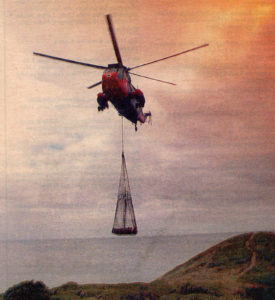 The airlift
The airlift
In the meantime, the appeal, which had set out to raise the estimated cost of £3000, finally totalled £5319. When all the costs were met the surplus was to be used for the continued upkeep of the memorial, which The Cornwall Heritage Trust had offered to undertake. Many individual donations were received from far and wide, with a memorial concert held at St Petroc’s Church in Bodmin on 27th February 1999 raising no less than £1500. This involved the combined talents of Bodmin Town Band, The County of Cornwall Male Choir, singers Marlene Berry and Kay Deeming and Benjamin Luxon as a reader of a selection of Dr Rowse’s poetry.
On the 29th July 1999, a perfect summers day, just a week after the memorial stone had arrived at Black Head it was formally unveiled before a large gathering by the patron of the appeal, Lady Mary Holborow JP, Lord Lieutenant of Cornwall. A fitting tribute to a major son of Cornwall it stands, well integrated now into its surroundings, looking over the view that Alfred Leslie Rowse loved for so long and is admired by the many local and visiting walkers who make their way out to this quite remote headland.
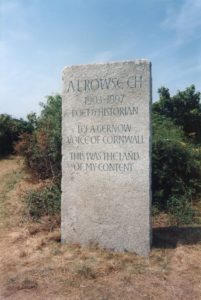 The A L Rowse Memorial
The A L Rowse Memorial
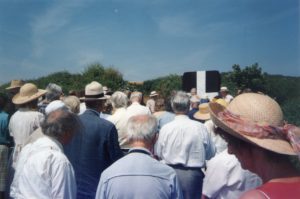 The Memorial Unveiling
The Memorial Unveiling
Elsewhere in Cornwall, his headstone stands in Charlestown Cemetery, with the inscription he requested and his wished-for memorial tablet in Truro Cathedral was unveiled by Lady Mary Holborow on 27th February 2000. It is situated close to the memorial to his friend the historian Charles Henderson, at the unveiling by Sir John Carew Pole and he gave the address. The Cornish slate plaque in St Austell Parish Church, which as he wished records his service as a chorister there between 1915 and 1922, was unveiled on what would have been his 100th Birthday, 4th December 2003, by Mrs Joan Hartley, his friend and neighbour of many years at Trenarren.
Copyright Phillip Hunt, November 2010.
Recollections of Dr A L Rowse CH by Phillip Hunt
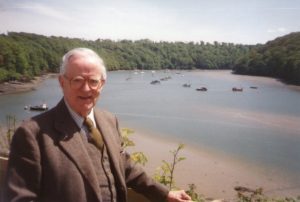 A L Rowse at Malpas on the River Fal
A L Rowse at Malpas on the River Fal
It was in 1980, soon after I had joined The National Trust to manage their retail shops in Cornwall, that I first met A L Rowse. I was called to our regional office reception to be told by Dr Rowse that I would of course, like my predecessor, be happy to stock copies of his many books, which he himself would provide, and deliver direct to the shops.
As it happened I had long been an admirer of his work and as he was prepared to supply his books on generous terms, saw an opportunity for us both to benefit from increased sales. At that time publishers were having a difficult time and anxious to clear stocks. Dr Rowse in his usual shrewd way had an agreement that he would purchase any surplus copies of his own titles at a very advantageous price, which he stored in bulk at Trenarren, his home near Black Head.
With his car boot fully loaded with books he would then sally forth around Cornwall to persuade any book shop he passed to purchase copies of whichever books he happened to have with him, out of the over one hundred titles that he had published during his lifetime.
In the run up to Christmas 1981 I asked him to carry out some book signing appearances at National Trust shops, to which he readily agreed. So began many years of such events, which built up a regular following, when book purchasers were treated to impromptu lectures on any subject which cropped up.
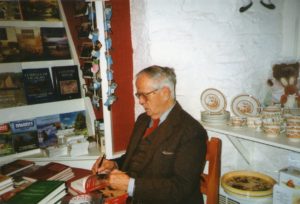 A L Rowse book signing at the National Trust Cotehele Shop in 1990
A L Rowse book signing at the National Trust Cotehele Shop in 1990
By this time, I had also been invited to take tea at Trenarren and so had begun what became for me a treasured friendship not only with Dr Rowse but also with his housekeeper, Phyllis Cundy, a doughty lady of immense charm and patience. After tea my wife, who often accompanied me, would be banished to the kitchen to talk to Phyllis, whilst I would be willingly subjected to what AL called a tutorial. This would range widely over many subjects, usually connected in some way to Cornwall of which he had an immense knowledge. Often he would talk of people he had known, many like Sir Arthur Quiller Couch, John Buchan or Ralph Vaughan Williams, particular heroes of mine. It was fascinating to hear first-hand about them and be able to relate them so much more to their published work.
I soon began to realise that the public image of Leslie Rowse as an irascible, sometimes arrogant man was not entirely the true picture. Behind his frequent berating of “third raters” was a man with a mischievous sense of humour, who could be kindly and generous. He also took a great interest in young people and generously encouraged those who showed signs of emulating his own desire to pursue an academic career.
After he sensibly gave up driving we would make frequent trips in my car to his favourite places around Cornwall, usually accompanied by Phyllis. We often stopped for lunch when, as a result of his increasing deafness, the whole restaurant would be treated to our private conversation, which could contain sometimes embarrassing, though usually hilarious, comments and revelations about people, living and dead.
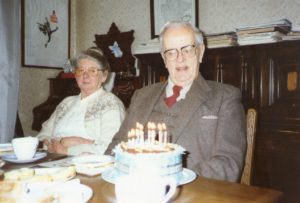 A L Rowse with Phyllis on his 85th Birthday in 1988
A L Rowse with Phyllis on his 85th Birthday in 1988
Great men, like us all, are seldom perfect but as in the case of Leslie Rowse, they make an indelible and lasting impression on those of us who have had the privilege of being close to them and sharing so many memorable moments with them.
Phillip Hunt.
Copyright 1998.
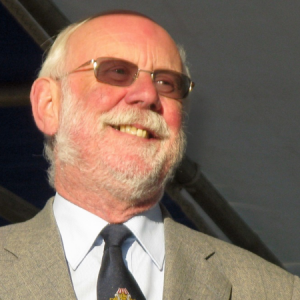
Phillip Hunt has had a lifetime interest in Cornish music, particularly brass bands, playing in them, writing about them, and broadcasting his weekly Sounds of Brass programme on BBC Radio for over 35 years. He is a Bard of the Cornish Gorsedh, with the Bardic name, Lef A Vrest, Voice of Brass.

Another very interesting article – thank you
A very interesting read!!
Though an avid follower of Cornish Story, I only wandered onto this article due to a recent interest in something else close by….an outcrop of rock that has apparently been widely used for memorial etc carvings in local churches. An admirer of much of ALR’s works on Cornwall, I have been delighted to read this enjoyable article on the creation of his memorial at Black Head, heretofore unbeknownst to me (possibly due to temporary exile to Ireland)!
Lovely to know their are people who love and cherish Cornwall, and its famous sons, sufficiently to embark on this not un-gargantuan task! Thank you ‘the memorial team’, and thank you ‘Cornish Story’ for keeping alive the history of the nation.